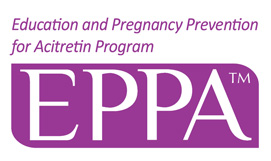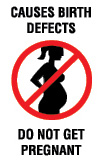Frequently Asked Questions (FAQs)
About Acitretin
You may have questions about acitretin. These FAQs include answers to questions people have asked about acitretin.
Before you begin treatment with acitretin, be sure to read all of the FAQs. This information does not take the place of talking with your prescriber about your medical condition or treatment. If you have any questions or would like more information, please speak with your prescriber.
Q: What is psoriasis?
- Psoriasis is a skin disease that causes cells in the outer layer of the skin to grow faster than normal and pile up on the skin's surface. In the most common type of psoriasis, the skin becomes inflamed and produces red, thickened areas, often with scales.
Q: Who gets psoriasis?
- Psoriasis seems to run in families. Both genetics and the environment may be involved. Psoriasis is not contagious-you cannot catch it from another person. You cannot spread it to another person.
Q: Where does psoriasis develop?
- Psoriasis can occur on any skin surface. Sometimes the lesions can appear in the same place on the left and right sides of the body.
Q: What can “trigger” your psoriasis symptoms?
- Common triggers include:
- Stress
- Injury to skin
- Certain medications
- Change in weather
- Infections such as strep throat
Q: What can I do to help my psoriasis?
- There is no cure for severe psoriasis. But there are things you can do that may help.
- Take care of your skin. Talk to your doctor about a suitable skin-care regimen
- Take or apply your medicines as directed by your doctor
- Know what makes your symptoms worse and try to avoid these things
- Keep all your doctor appointments
What are the basics of skin care for psoriasis?
- Talk to your doctor about skin-care tips. For example, some doctors may tell their patients with severe psoriasis to:
- Apply emollients, which may help soften the skin
- Use moisturizers, which may help lock in the skin's own moisture
- Moisturize right after bathing, while the skin is still damp, to lock in the most amount of moisture
- Bathe in lukewarm water using a mild, nondrying cleanser and avoid using body sponges or washcloths as the friction can irritate the skin
- Take care not to rub the skin dry after bathing; instead use a towel to partially pat the skin dry, then apply a moisturizer
- Try to choose clothes made with cotton. Compared with other fabrics, they are less likely to irritate your skin or cause you to overheat
- Try to avoid scratching your skin. Scratching can break the skin and may worsen your psoriasis
- Be sure to eat a balanced diet, drink a lot of water, and get plenty of sleep. Taking good care of yourself overall may help your skin.
- Also, talk to your doctor about sun exposure and using sunscreen.
- Remember, talk to your doctor about whether these tips are right for you.
Q: What is acitretin?
- Acitretin is a prescription medicine for the treatment of severe psoriasis in adults. If you can get pregnant, you should only use acitretin if other medicines do not work for your severe psoriasis or you cannot use other psoriasis medicines. Most patients will have their psoriasis return if they stop treatment.
- Because acitretin can have serious side effects, you should talk with your prescriber about whether the possible benefits of acitretin outweigh its possible risks.
- Acitretin may not work right away. You may have to wait 2 to 3 months before you get the full benefit of acitretin. Psoriasis may get worse for some patients when they first start treatment with acitretin.
- Acitretin has not been studied in children.
Q: What is the most important information I should know about acitretin?
- Acitretin can cause severe birth defects. If you are a female who can get pregnant, you should use acitretin only if:
- you are not pregnant now,
- you can avoid becoming pregnant while taking acitretin and for at least 3 years after stopping acitretin, and
- other medicines do not work for your severe psoriasis or you cannot use other psoriasis medicines.
- Acitretin can also cause liver injury. Acitretin has been associated with abnormal liver function tests. Your prescriber should monitor how your liver is working with blood tests.
Q: Who should not take acitretin?
- Do NOT take acitretin if you can get pregnant. Do not take acitretin if you are pregnant or might get pregnant during treatment with acitretin or at any time for at least 3 years after you stop treatment with acitretin (see the "What are the important warnings and instructions for females taking acitretin?" section in the Medication Guide).
- Do NOT take acitretin if you are breast feeding. Acitretin can pass into your milk and may harm your baby. You will need to choose either to breast feed or take acitretin, but not both.
- Do NOT take acitretin if you have severe liver or kidney disease.
- Do NOT take acitretin if you have repeated high blood lipids (fat in the blood).
- Do NOT take acitretin if you take these medicines:
- methotrexate
- tetracyclines
The use of these medicines with acitretin may cause serious side effects.
Do NOT take acitretin if you are allergic to acitretin, the active ingredient in acitretin, to any of the other ingredients in acitretin (see the end of the Medication Guide for a list of all the ingredients in acitretin), or to any medicines that are like acitretin. Ask your prescriber or pharmacist whether any drugs you are allergic to are like acitretin.
-
- Tell your prescriber if you have or ever had:
- diabetes or high blood sugar
- liver problems
- kidney problems
- high cholesterol or high triglycerides (fat in the blood)
- heart disease
- depression
- alcoholism
- an allergic reaction to a medication
- Tell your prescriber if you have or ever had:
Your prescriber needs this information to decide if acitretin is right for you and to know what dose is best for you.
Back to TopQ: What else should I avoid while taking acitretin?
- Avoid alcohol. Females who are able to become pregnant must avoid drinks, foods, medicines, and over-the-counter products that contain alcohol. The risk of birth defects may continue for longer than 3 years if you swallow any form of alcohol during treatment with acitretin and for 2 months after stopping acitretin (see “What are the important warnings and instructions for females taking acitretin?”).
- Avoid giving blood. Do not donate blood while you are taking acitretin and for at least 3 years after stopping acitretin. Acitretin in your blood can harm an unborn baby if your blood is given to a pregnant woman. Acitretin does not affect your ability to receive a blood transfusion.
- Avoid night driving if you develop any sudden vision problems. Stop taking acitretin and call your prescriber if this occurs.
- Avoid non-medical ultraviolet (UV) light. Acitretin can make your skin more sensitive to UV light. Do not use sunlamps, and avoid sunlight as much as possible. If you are taking light treatment (phototherapy), your prescriber may need to change your light dosages to avoid burns.
- Avoid dietary supplements containing vitamin A. Acitretin is related to vitamin A. Therefore, do not take supplements containing vitamin A because they may add to the unwanted effects of acitretin. Check with your prescriber or pharmacist if you have any questions about vitamin supplements.
- DO NOT SHARE acitretin with anyone else, even if they have the same symptoms. Your medicine may harm them or their unborn child.
Q: What should I tell my doctor before taking acitretin?
- Tell your prescriber if you have or ever had:
- liver problems
- alcoholism
- kidney problems
- high cholesterol or high triglycerides (fat in the blood)
- heart disease
- depression
- diabetes or high blood sugar
- an allergic reaction to a medication
- Your prescriber needs this information to decide if acitretin is right for you and to know what dose is best for you.
- Tell your prescriber about all the medicines you take, including prescription and non-prescription medicines, alcohol-containing medicines, vitamins, and herbal supplements. Some medicines can cause serious side effects if taken while you also take acitretin. Some medicines may affect how acitretin works, or acitretin may affect how your other medicines work. Be especially sure to tell your prescriber if you are taking the following medicines:
-
- methotrexate
- tetracyclines
- glyburide
- phenytoin
- vitamin A supplements
- progestin-only oral contraceptives (“minipills”)
- TEGISON or TIGASON (etretinate). Tell your prescriber if you have ever taken this medicine in the past.
- St. John's wort herbal supplement
- Tell your prescriber if you are getting phototherapy treatment. Your doses of phototherapy may need to be changed to prevent a burn.
Q: How should I take acitretin?
- Take acitretin with food.
- Be sure to take your medicine as prescribed by your prescriber. The dose of acitretin varies from patient to patient. This dose may change during treatment.
- If you miss a dose, do not double the next dose. Skip the missed dose and resume your normal schedule.
- If you take too much acitretin (overdose), call your local poison control center or emergency room.
Q: When will I see results with acitretin?
- Acitretin may not work right away. You may have to wait 2 to 3 months before you get the full benefit of acitretin. Psoriasis may get worse for some patients when they first start treatment with acitretin.
Q: What else should I know about acitretin?
- You should have blood tests for liver function, cholesterol, and triglycerides before starting treatment and during treatment to check your body's response to acitretin. Your prescriber may also do other tests.
- Once you stop taking acitretin, your psoriasis may return. Do not treat this new psoriasis with leftover acitretin. It is important you see your prescriber again for treatment recommendations because your situation may have changed.
- Do not use acitretin for a condition for which it was not prescribed. Do not give acitretin to other people, even if they have the same symptoms that you have.
- Keep acitretin and all medicines out of the reach of children.
Acitretin is a prescription medicine for the treatment of severe psoriasis in adults. If you can get pregnant, you should only use acitretin if other medicines do not work for your severe psoriasis or you cannot use other psoriasis medicines.
Most patients will have their psoriasis return if they stop treatment.

